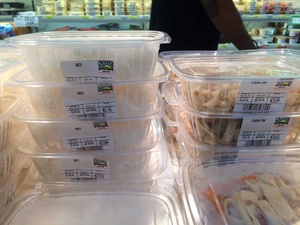Sansei Nakashima Brothers Are Leading Their Family Store Into Its Sixth Decade of Business
Rice—and lots of gambare (persevere) spirit—are just two of the many keys to Pukalani Superette’s business success in Upcountry Maui.
Ask owners—and brothers—Aric and Myles Nakashima what their biggest seller is and they’ll tell you it’s rice.
“Rice?” you ask. Yes, hot rice—already cooked and ready to eat with any type of okazu (side meat or vegetable dishes).
“Everybody eats rice,” said younger brother Myles, adding that customers often buy rice and some of the hot food entrees that the popular mom and pop store prepares and sells.
“They no like go home cook rice and wait one hour. Whatever the case is, people eat rice,” he added.
Myles wouldn’t say how many containers of rice they sell daily; neither would he disclose the sales from the prepared rice. However, he did say that the store cooks about 150 pounds of rice every day.
While Pukalani Superette’s success is, of course, not based solely on sales of the local staple, the brothers said that as a small local business, they have to persevere, especially against large grocery chains, and “no matter how bad it is,” hold their heads up and keep moving forward.
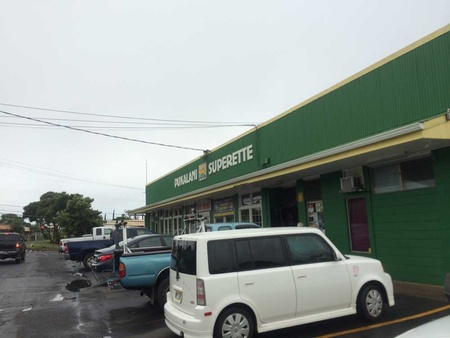
That’s where the gambare spirit comes into play.
The brothers say they just have to work hard every day. They said they remember working nearly every day when they were younger—there was no such thing as calling in sick. In earlier days, at least one family member had to open up the store every morning. Now, with more employees and a general manager, Jerry Masaki, to help with the day-to-day operations, there is more flexibility in terms of their business hours.
Aric said the relatives who preceded them had a “mean work ethic” that would probably put him and his brother to shame. He said they probably worked at the store from sun-up to sun-down.
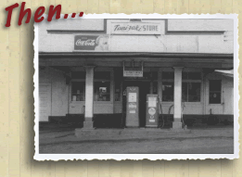
Courtesy of pukalanisuperette.com.
Pukalani Superette was founded as Tanizaki Store in Wailuku by the brothers’ maternal grandparents, Takeo and Kome Tanizaki. The couple had immigrated to Hawai‘i from Yabe Village in Fukuoka, Japan, to work on the plantations. After fire destroyed their store in Wailuku, the Tanizakis decided to rebuild, but in Pukalani rather than Wailuku. That was in 1927. They built their new store Upcountry, at the corner of Makawao Avenue and the old Haleakalä Highway, where the store remains to this day. In 1955, a new store was built on the site, and the name was changed to Pukalani Superette.
This year marks the store’s 60th anniversary as Pukalani Superette. A celebration was held earlier with family members and employees, and store specials and giveaways for customers are ongoing throughout October.
Besides cooked rice, the store, which regulars nicknamed “Puk Sup” (pronounced “Pook Soup”), is known for its prepared foods such as its signature chili chicken (a spicy chicken thigh or drummette), macaroni salad, chow fun, and tako poke. It also sells locally grown and organic produce and grocery items, including Hawai‘i’s favorite canned meat, Spam, which has been on the store’s inventory list for decades.
The store also has a catering business, which is popular among visiting hula hälau (hula schools) and sports teams.
Pukalani Superette still bears touches from its early days—Aric noted that the small fishing supply section is a carryover from his grandparents’ Tanizaki Store.
The store’s interior remains as humble as it’s always been with no fancy signs or color schemes.
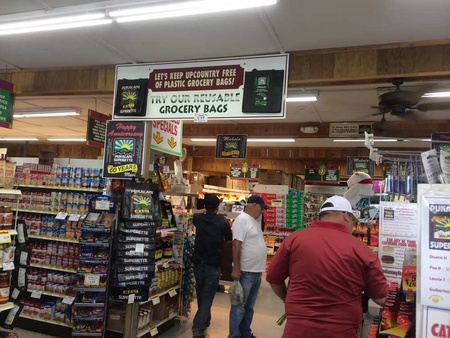
“We are not the brass and glass, wood grain type of style,” Myles said.
Aric added that they try to keep the store local and friendly.
Myles said that when he’s in the store, he reaches out to the customers to see if there is anything he and Aric can improve on and to see what his customers want and need. “For me, I make it a point to talk to the customers,” he said.
“Customers remember when you take the time to help them,” Myles said, adding that unlike a corporate chain business, Pukalani Superette can more easily bring in special goods and groceries if enough customers want them and can make adjustments where needed.
“You act on it—they are happy,” he said of their customers.
That personal touch is what makes them special and enables them to thrive and survive, said Aric.
“You cannot stop competition. You weather the storm (by) picking a niche and expanding on that,” he added.
Part of Pukalani Superette’s niche is its hot, prepared meals, which have proven convenient for workers heading to work in town from Upcountry. In the afternoon, many Upcountry residents heading home stop in for a snack or to pick up something for dinner.
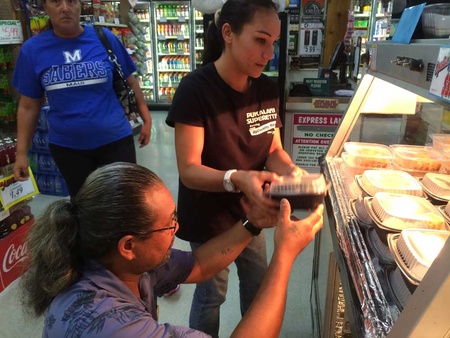
The brothers note that they are “conveniently” located between the Upcountry communities of Pukalani and Makawao and also on the road to Kula.
The only other large grocery store in the area is Foodland in Pukalani, which is just a few minutes away. But the Nakashima brothers say the easy access to their store allows shoppers to zip in and out without having to go into a shopping center, giving them an advantage.
They said the store’s location has long been an asset, from as far back as the 1960s, when pineapple and sugar workers lived and worked nearby.
Aric and Myles recall that decades ago, the Tanizaki family home was also on the property. Upcountry life was much more rural back then. There were mango and avocado trees on the property, and pineapple, and even cotton, which their grandmother used to stuff the futon (comforters) she made.
The old Tanizaki Store also had a gasoline pump. Their grandmother and their mother, Sumiko Tanizaki Nakashima, along with other family members and close friends, also made sushi, which was sold in a shop on the property. As the women retired, so did Pukalani Superette’s sushi offerings. In the 1990s, the store discontinued its Pukalani Superette-made sushi, although they still sell sushi from other local makers.
The brothers’ late father, Moriaki Nakashima, worked for Kahului Railroad and spent his last years as a tugboat engineer. But, he, like just about everyone in the family, also put in time at the store.
At a time when many mom and pop stores are shutting down due to increased competition from big box stores, the rising costs of doing business or a lack of interest by the younger generation, Pukalani Superette has a fighting chance of surviving with another generation of family members.
Aric’s son Jayson, who is 27, works at the store, while his daughter Megan works on O‘ahu. And, Myles’ daughter Michelle, a high school junior, has also expressed an interest in the store. His son Matthew, a high school sophomore, is still a question mark.
Asked what their relatives would think of their success thus far, Myles said with a laugh, “They would be very proud. (But) it won’t be perfect in their eyes.”
*This article was originally pubished in The Hawaii Herald, on October 16, 2015.
© 2015 Melissa Tanji


